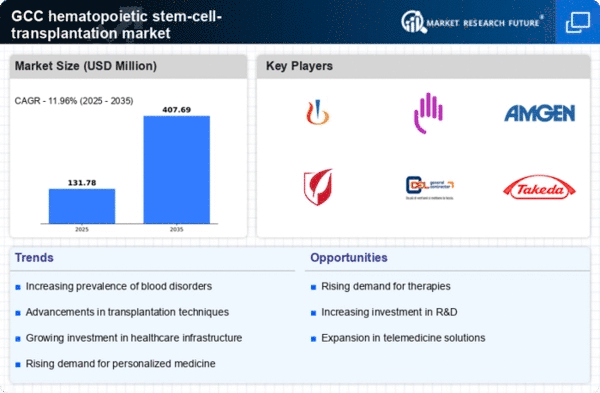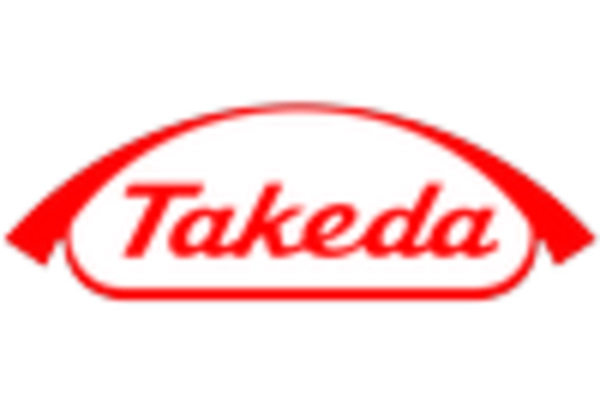Advancements in Stem Cell Research
Ongoing advancements in stem cell research are significantly influencing the hematopoietic stem-cell-transplantation market. Research initiatives in the GCC have led to breakthroughs in understanding stem cell biology, enhancing the efficacy of transplantation procedures. For example, recent studies have demonstrated improved engraftment rates and reduced complications associated with stem cell transplants. The investment in research and development is expected to reach approximately $200 million by 2026, indicating a strong commitment to innovation in this field. These advancements not only improve patient outcomes but also attract more patients seeking cutting-edge treatments. As the scientific community continues to explore the potential of stem cells, the hematopoietic stem-cell-transplantation market is poised for substantial growth, driven by enhanced treatment protocols and increased clinical success rates.
Government Initiatives and Funding
Government initiatives aimed at enhancing healthcare infrastructure are playing a crucial role in the hematopoietic stem-cell-transplantation market. In the GCC, various governments have allocated substantial funding to improve healthcare services, including stem cell transplantation. For instance, recent budgets have earmarked over $150 million for the development of specialized transplant centers and training programs for healthcare professionals. These initiatives are designed to increase the availability of transplantation services and improve patient access to life-saving treatments. Furthermore, regulatory bodies are streamlining approval processes for new therapies, which may lead to a quicker introduction of innovative treatments in the market. As a result, the hematopoietic stem-cell-transplantation market is likely to benefit from enhanced support and resources, fostering an environment conducive to growth and development.
Rising Demand for Personalized Medicine
The growing trend towards personalized medicine is significantly impacting the hematopoietic stem-cell-transplantation market. Patients increasingly seek tailored treatment options that align with their unique genetic profiles and health conditions. In the GCC, the shift towards personalized approaches is evident, with healthcare providers adopting more individualized treatment plans. This trend is supported by advancements in genomic research and the availability of targeted therapies, which enhance the effectiveness of stem cell transplants. The market for personalized medicine is projected to grow at a CAGR of 10% over the next five years, indicating a robust demand for customized treatment solutions. As healthcare systems adapt to these changes, the hematopoietic stem-cell-transplantation market is likely to evolve, offering more specialized and effective treatment options for patients.
Collaboration Between Healthcare Institutions
Collaboration between healthcare institutions is emerging as a vital driver for the hematopoietic stem-cell-transplantation market. In the GCC, partnerships among hospitals, research centers, and universities are fostering knowledge exchange and resource sharing. These collaborations aim to enhance clinical practices and improve patient care in stem cell transplantation. For instance, joint research initiatives have led to the development of new protocols that increase transplant success rates. Additionally, shared resources enable institutions to offer comprehensive care, including pre- and post-transplant support. The establishment of collaborative networks is expected to enhance the overall quality of care, thereby increasing patient trust and willingness to undergo transplantation. As these partnerships continue to grow, the hematopoietic stem-cell-transplantation market is likely to experience a positive impact, driven by improved clinical outcomes and patient satisfaction.
Increasing Incidence of Hematological Disorders
The rising prevalence of hematological disorders, such as leukemia and lymphoma, is a primary driver for the hematopoietic stem-cell-transplantation market. In the GCC region, the incidence of these diseases has shown a notable increase, prompting healthcare systems to seek effective treatment options. For instance, the number of reported cases of leukemia in the GCC has risen by approximately 15% over the past five years. This trend necessitates the expansion of transplant facilities and services, thereby enhancing the demand for hematopoietic stem-cell transplantation. As healthcare providers aim to improve patient outcomes, investments in advanced treatment modalities are likely to grow, further propelling the market. The increasing burden of these disorders underscores the critical need for innovative therapies, positioning the hematopoietic stem-cell-transplantation market as a vital component of the healthcare landscape in the region.
















